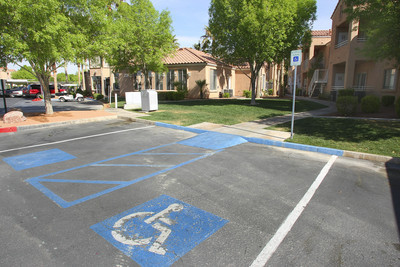Case seen as ‘groundbreaking’
A case heard last week by the 9th U.S. Circuit Court of Appeals involving a North Las Vegas apartment complex has potential for "groundbreaking" ramifications, a local attorney for one of the defendants said Monday.
An organization for disabled citizens has sued multiple defendants who had any part in designing and building Craig Ranch Villas, formerly the Villas at Rancho del Norte, in 1997 for violations of the Fair Housing Act, alleging inadequate sidewalk ramps for wheelchairs, lack of accessible building entrances and undersized interior doorways, among other things.
The case has been incorporated into a lawsuit from Idaho (Garcia v. Brockway) and is being followed nationally by major multifamily and fair housing organizations, said Bill Curran of Ballard Spahr Andrews & Ingersoll. The Las Vegas law firm is representing Michael Turk, one of the principal builders who has since sold his majority interest in the property and moved to California.
The outcome of the court's ruling will determine the statute of limitations for violations of the Fair Housing Act for all multifamily apartments and condos built after 1991, Curran said.
"We don't want to minimize the impact of improper construction for the disabled," he said. "Nobody is against the disabled. The question this case presents is how long are people at risk for liability and is there a statute of limitations after which claims are barred."
In a 2-1 vote in September, the 9th U.S. Circuit Court held that a lawsuit for design and construction discrimination under the FHA must be brought within two years of issuance of a certificate of occupancy.
Attorneys for Salt Lake City-based Disabled Rights Action Committee, plaintiffs in the case, argued that as long as a dwelling is noncompliant with the Fair Housing Act, the statute of limitations would not begin.
"There's a vast amount of multifamily housing that will be shielded from becoming compliant if the court creates a statute of repose," Disabled Rights Action Committee attorney Richard Armknecht said. "What it really comes down to is whether it's a statute of repose or a statute of limitations. We want to keep the law as Congress intended. We don't want the court to change it."
In a March 25 hearing before an 11-judge panel at the 9th U.S. Circuit Court, Josh Reisman, partner at Ballard Spahr in Las Vegas, argued that unless the court recognizes a clearly defined date for beginning the statute of limitations, all current and past owners of multifamily projects, as well as architects, engineers and contractors, would be exposed to perpetual liability.
"Until these remedies are in place, you're subject to suits indefinitely and you can't put an end to liability," he said.
Reisman said lawyers across the country, in the guise of fair housing activists, are "scouring" developments for Fair Housing Act violations in an effort to force cash settlements, a trend similar to the construction-defect litigation that permeated Las Vegas a few years ago. All of the defendants in the North Las Vegas case have settled except for Turk, he said.
No federal court of appeals has rendered a decision that would be a "controlling" precedent, Reisman said.
Attorney Mike Evans, who filed briefs with the court on behalf of Silver State Fair Housing Council and Nevada Disability Advocacy and Law Center, would like to see a ruling to allow "meaningful enforcement" of the Fair Housing Act's accessibility requirements.
The law requires certain housing to be built in a manner that's at least minimally accessible to people with disabilities, he said.
"It kind of sets the floor for accessibility. Think about all the Iraq war veterans coming home with disabilities," Evans said. "The question becomes, 'What happens if housing is built out of compliance?' so you have housing that should be accessible but isn't."
The opposing view is that some disabled persons couldn't file a lawsuit or administrative complaint to enforce the law because it would be two years after construction is completed, he said.
"That completely undermines the purpose of the law," Evans said. "The other thing is if you built these apartments in violation of local building codes or zoning, it doesn't go away until you resolve the problem. That's all we're saying. You've got to correct it."
If the 2-1 vote is overturned by the full 11-judge panel, developers of multifamily housing could continue to be sued for damages and retrofitting for projects that are 10 years to 15 years old, Reisman said. Without the cooperation of current owners, developers would have to purchase the property and make modifications themselves or destroy the buildings.
"I'm concerned who's going to want to build multifamily housing and subject themselves to lawsuits for the rest of their lives," Reisman said. "It's going to have a cooling effect on multifamily. It could be incredibly negative for disabled rights organizations and I don't think they realize that."
Armknecht said the court's September decision was contrary to other cases and was vacated, or withdrawn, upon his petition for a rehearing.
While Circuit Judges Alex Kozinski and Richard Tallman wrote a combined 12 pages in support of the decision, dissenting Judge Raymond Fisher wrote 17 pages against it, Armknecht noted.
Contact reporter Hubble Smith at hsmith@reviewjournal.com or (702) 383-0491.






















